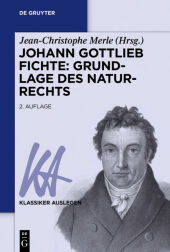 Neuerscheinungen 2016Stand: 2020-02-01 |
Schnellsuche
ISBN/Stichwort/Autor
|
Herderstraße 10
10625 Berlin
Tel.: 030 315 714 16
Fax 030 315 714 14
info@buchspektrum.de |

Johann G. Fichte, Jean-Christophe Merle
(Beteiligte)
Johann Gottlieb Fichte: Grundlage des Naturrechts
Herausgegeben von Merle, Jean-Christophe; Vorlage: Fichte, Johann G.
2., bearb. Aufl. 2016. VII, 210 S. 230 mm
Verlag/Jahr: DE GRUYTER 2016
ISBN: 3-11-044172-1 (3110441721)
Neue ISBN: 978-3-11-044172-7 (9783110441727)
Preis und Lieferzeit: Bitte klicken
In this series the most important works in the history of philosophy are discussed with cooperative commentary from internationally renowned philosophers. Each volume contains 12 to 15 essays, and follows the organizational structure of the discussed philosophical work. Essential reading for students and academics alike, the series elucidates the major themes in philosophy without the need for time-consuming consultation of secondary literature.
Johann Gottlieb Fichtes "Grundlage des Naturrechts" stellt einen Wendepunkt der Rechts- und Staatsphilosophie dar. Der erste Teil (1796) begründet den Begriff des Rechts und seine systematische Anwendung weder durch eine Grundanthropologie wie im klassischen Naturrecht noch, wie Kant, durch einen kategorischen Imperativ. Vielmehr wird der Rechtsbegriff als Bedingung des Selbstbewußtseins eines endlichen Vernunftwesens deduziert. Dabei erweist sich das Recht als eine notwendige Bedingung der Intersubjektivität und diese wiederum als eine notwendige Bedingung der Subjektivität. Der zweite Teil (1797) liefert eine für ihre Originalität, Radikalität und Systematizität bekannte Anwendung. In kritischer Auseinandersetzung mit Immanuel Kants "Rechtslehre" (1797) entwickelt Fichte eine Vertragstheorie der Regierung und ihrer Kontrollinstanz, eine Theorie des Eigentumsrechts, des Strafrechts, des Ehe- und Familienrechts und des Völkerrechts. In 14 Originalbeiträgen bietet der kooperative Kommentar eine differenzierte, für den Seminargebrauch geeignete Interpretation des umstrittenen rechtsphilosophischen Klassikers.
In this series the most important works in the history of philosophy are discussed with cooperative commentary from internationally renowned philosophers. Each volume contains 12 to 15 essays, and follows the organizational structure of the discussed philosophical work. Essential reading for students and academics alike, the series elucidates the major themes in philosophy without the need for time-consuming consultation of secondary literature.
Jean-Christophe Merle, Universität Vechta.


